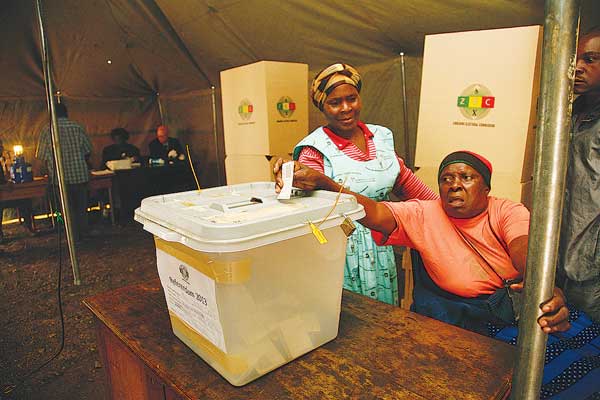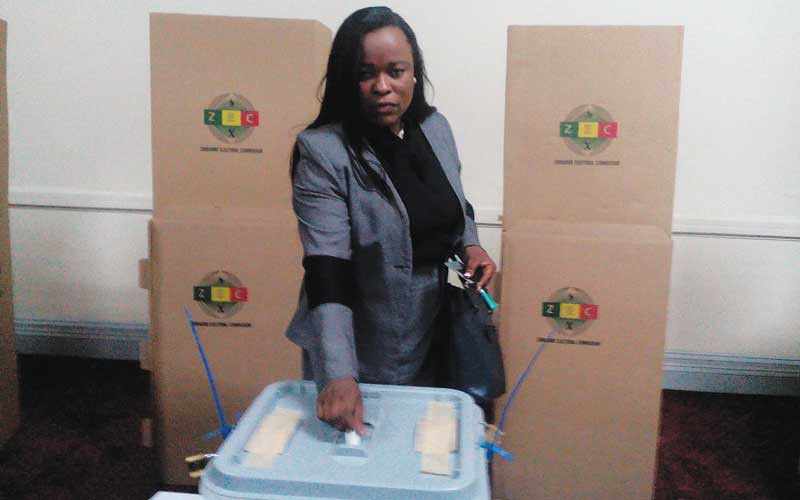
Electoral reforms good for development ZIMBABWE will next year go to polls. Battlelines have already been drawn between President Emmerson Mnangagwa, representing Zanu PF and Citizens Coalition for Change leader Nelson Chamisa.
It will be a repeat of the 2018 elections where Chamisa narrowly lost to Mnangagwa.
Chamisa contested the results only to lose the case at the Constitutional Court.
Since the formation of MDC in the 2000s, Zimbabwe has had disputed elections.
The 2023 poll results are likely to be contested if nothing is done to level the playing field.
Zimbabwe is crying for reforms, including the alignment of laws to the Constitution.
It seems our parliamentarians have collectively failed us.
I don’t know whether it was deliberate, ignorance or total incompetence on the part of our parliamentarians because nothing has been done to align laws to the Constitution.
- Chamisa under fire over US$120K donation
- Mavhunga puts DeMbare into Chibuku quarterfinals
- Pension funds bet on Cabora Bassa oilfields
- Councils defy govt fire tender directive
Keep Reading
Surely, if our parliamentarians could at one point agree on the impeachment of the late former President Robert Mugabe, why should they fail to agree on their number one mandate?
The lack of reforms has stagnated the country’s progress. It seems people are still stuck with the old Constitution. For the past five years, activists have been calling for reforms.
The implementation of political and economic reforms will result in a more stable and promising future for the Zimbabwean people.
Nothing has been done on the ground. Where were the parliamentarians all these years?
You can’t compare the current crop of Members of Parliament with the ones we had in 1995 going backwards to 1980. Reforms lead to betterment of the nation. No reforms, no progress. –Mai Ruru
Green energy way to go AN unprecedented heatwave last June, described by meteorologists as a “stalling dome” of high heat, left me feeling I could never again complain about the weather being too cold. But then complain I somewhat did when hit by an unprecedentedly cold bunch of days in January, described by meteorologists as a “stalling dome” of freezing cold.
Ironic, yes, but not coincidental. I believe the stalling dome of immense heat was connected to the stalling freeze dome a half-year later, both weather events having been remarkable temperature record breakers.
However, unlike today’s children, I, a 54-year-old, don’t have to face so many bleak decades of extreme weather and its consequences. I still find hope for humankind, though mostly in environmentally conscious and active young people, especially those approaching or reaching voting age. In contrast, the dinosaur electorate which has been voting into high office consecutive mass-pollution promoting or complicit/complacent governments for decades are gradually dying off thus making way for voters who fully support a healthy earth thus populace.
Mass global addiction to fossil fuel products by the larger public undoubtedly helps keep the average consumer quiet about the planet’s greatest polluter, lest they are publicly deemed hypocritical. Also, relatively trivial politics diverts attention away from some of the planet’s greatest polluters, where it should and needs to be sharply focused.
Meanwhile, if the universal availability of green energy alternatives will come at the profit-margin expense of traditional “energy” production companies, one can expect formidable obstacles, including the political and regulatory sort. If something notably conflicts with corporate big-profit interests, even very progressive motions are greatly resisted, often enough successfully. – Frank Sterle Jr
Ema must not promote tribalism
ENVIRONMENTAL Management Agency (Ema) has produced a booklet titled Guidelines for community gully reclamation. I have the booklet because it educates us on the causes, effects and control of gullies where they occur, and how reclamation can be carried out.
Ema also has an inspirational slogan Together Protecting the Environment. This is where I differ with Ema and rightly so, and in a big way and pulling no punches.
All of the 14 pages of the booklet are written in Shona and English in a country with 16 official languages. Of course, I am not suggesting that all these languages must be used in the booklet, no!
I would be an idiot if I ever entertained the idea that Ndebele is the second largest language in the country. The other 13 languages are integral parts of Shona and Ndebele and English is basically for communication and record.
I take the greatest exception if not offence of Ema’s exclusion of Ndebele as this denies the Ndebele people vital information on a vital topic in the conservation of the soil and their natural resources.
Ema is a national asset born out of an Act of Parliament largely at the expense of the taxpayers of which the Ndebeles and their allied minority tribes are a part. Ema must not join the State media in promoting tribalism.
How did the booklet ever go through all officialdom when it is so blatantly tribalistic and divisive? This booklet is violating section 56 of the Constitution.
What is the Information ministry doing about this blatant tribalism based on regionalism? Zanu PF wants votes from Matabeleland and yet its government gives tacit approval to tribalism and regionalism.
Section 56 of the Constitution is quite clear on equality and non-discrimination.
Need I say more! When Ema and State media use English and Shona, it means they are according unfair advantage and privilege to these two languages, thereby denying the rest of the languages access to vital information.
This is called marginalisation in high definition. MPs and councillors in Matabeleland don’t care about this inequality and discrimination, yet it is enshrined in the Constitution.
Effectively, they don’t represent the Ndebeles, but their political parties, ruling or in opposition.
In fact, Ndebeles are not switched on and time has run out for them to do anything about it.
Kuyadanisa uyazi (It’s sad, you know)! Is it inherent in the Ndebele DNA to be used, rubbished and exploited like Trojan horses? – Martin Stobart











